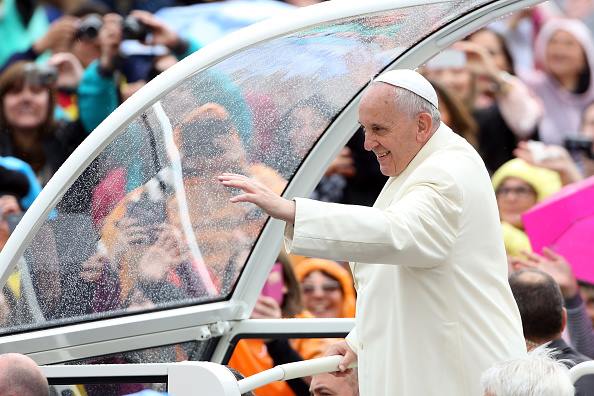-

-
During his General Audience on Wednesday, Pope Francis reflected on his Apostolic Voyage to Albania.
Below, please find Vatican Radio’s translation of the full text of Pope Francis’ remarks:
Dear brothers and sisters,
Today I want to speak about the Apostolic Voyage I took to Albania last Sunday. I do so first of all as an act of thanksgiving to God, who allowed me to undertake this Visit in order to show, even in a physical and tangible way, my closeness and the closeness of the whole Church to this people. Next I desire to renew my fraternal gratitude to the Albanian Episcopate, to the priests and to the men and women religious who worked so hard. My grateful thoughts go out also to the Authorities that welcomed me with such courtesy, as well as to those who cooperated for the realization of the visit.
This visit was born from the desire to go to a country that, having long been oppressed by an atheistic and inhuman regime, is now living an experience of peaceful coexistence among its various religious components. It seemed important to encourage them along this path, so that they might continue with tenacity and deepen all aspects for the benefit of the common good. For this reason, at the centre of the Voyage there was an inter-religious meeting where I was able to see, with great satisfaction, that the peaceful and fruitful coexistence between people and communities belonging to different religions is not only desirable, but also concretely possible and practicable. They practice it! It is a genuine and fruitful dialogue that avoids relativism and takes into account the identity of each. What unites the various religious expressions, in fact, is the journey of life, the good will to do good to others, without denying or downplaying their respective identities.
The encounter with the priests, consecrated men and women, the seminarians and the lay movements was the occasion to remember gratefully, with particular emotion, the many martyrs of the faith. Thanks to the presence of some elderly people, who experienced the terrible persecutions in their own flesh, the faith of many heroic witnesses of the past, who followed Christ to the very end, continues to resonate. It is precisely from the intimate union with Jesus, from the relationship of love with Him, that the strength to face the painful events that led to them to martyrdom rose up in these martyrs, as in every martyr. Even today, as yesterday, the strength of the Church is not given so much by organizational capabilities or structures (which are also necessary). The strength of the Church is not found there. Our strength is the love of Christ! A strength that sustains us in times of trouble and inspires the daily apostolic action to offer to all goodness and forgiveness, thus testifying to the mercy of God.
Travelling along the principle road of Tirana, that takes you from the airport to the great central piazza, I was able to see the pictures of forty priests killed during the communist dictatorship, for whom the cause of beatification has been opened. To these are added the hundreds of Christian religious and Muslims killed, tortured, imprisoned, and exiled solely for believing in God. They were dark years, during which religious liberty was razed to the ground and it was forbidden to believe in God; thousands of churches and mosques were destroyed, transformed into stores and cinemas that propagated Marxist ideology; religious books were burned; and parents were forbidden to give to their children the religious names of their ancestors. The remembrance of these dramatic events is essential for the future of a people. The memory of the martyrs who resisted in the faith is the guarantee for the destiny of Albania; for their blood was not shed in vain, but is a seed that will bear the fruits of peace and fraternal collaboration. Today, in fact, Albania is an example not only of the rebirth of the Church, but also of peaceful co-existence among the religions. Therefore, the martyrs are not the vanquished, but the victors: in their heroic witness the omnipotence of God, who always consoles His people, shines forth, opening new paths and horizons of hope.
I have entrusted this message of hope, founded on faith in Christ and on the memory of the past, to the whole population of Albania, whom I saw enthusiastic and joyful in my meetings and in the celebrations, as well as in the streets of Tirana. I encouraged everyone to draw new energy from the Risen Lord, to be able to be an evangelical leaven in society and to engage, as is already being done, in charitable and educational activities.
I give thanks once more to the Lord because, with this Voyage He allowed me to meet a strong and courageous people, [a people] that has not allowed themselves to be bent in pain. To the brothers and sisters of Albania I renew the invitation to courage to do good, to build the present and the future of their country and of Europe. I entrust the fruits of my visit to the Madonna of Good Counsel, venerated in the Sanctuary of Scutari dedicated to her, that she might continue to guide the path of this martyr-people. The bitter experience of the past is ever more rooted in the openness towards the brothers, especially the weakest, and makes it the protagonist of that dynamism of charity that is so necessary in today’s socio-cultural context. I would like for all of us today to salute this courageous, hard-working people, who seek unity in peace.
Source: News.va





